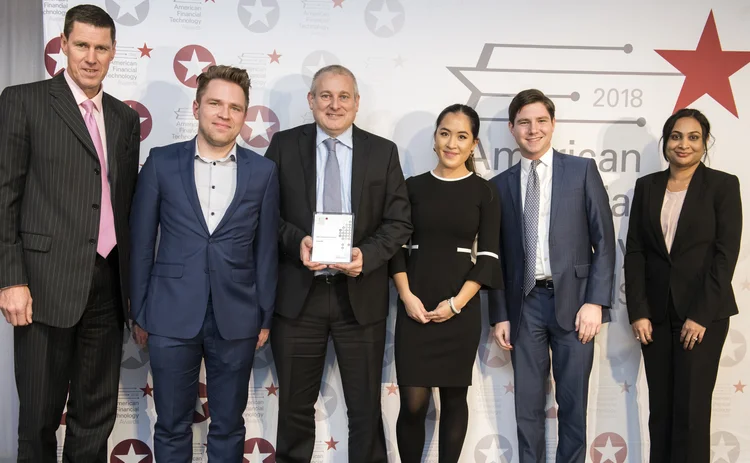AFTAs 2018: Best Collaboration Initiative—AxiomSL

AxiomSL wins this year’s AFTA for the best collaboration initiative, a category won last year by SS&C Advent and Maitland. AxiomSL’s data integrity and control initiative, responsible for delivering this year’s win, is designed to help clients comply with Comprehensive Capital Analysis and Review (CCAR) requirements and other complex regulatory mandates that have sprung up in the last few years.
The company works with its clients by way of a consultation process on how best to approach their implementation of regulations like CCAR. The platform allows clients to compile reports for regulations that require granularity, something that they previously were not required to do.
Eli Feuer, a vice president and solution architect at AxiomSL, says transparency is a big focus for the company, as it wants to provide its end-users with the ability to point to specific records used for reporting purposes. “A big focus for us is transparency—any change we make is saved forever,” Feuer says. “We’re not a black box so clients can see how data comes in. This transparency makes it easy for institutions to point out which records make up the amounts they have reported. It also helps us focus on end-users because we want them to know how the platform works.”
Beyond knowing how the platform works, clients also have to deal with the constantly evolving nature of regulations. For the past year, Feuer says, AxiomSL has built new products around new or upcoming rules, as well as introducing new features. One such update is a data lineage function that traces individual records from source to final report. Feuer says clients demanded the ability to map out data to better understand where the data is coming from and trace its ownership. The firm also released an initial product for the new Federal Deposit Insurance Corp. (FDIC) rule that requires banks with two million or more account deposits to report insurance calculations. The FDIC regulation is not due to come into force until 2020, but the company decided to release a version based on initial rules, which will be updated when more information becomes available. Another update was around rules for single counterparty credit limits, which comes into force this year.
Feuer says clients are moving past just wanting to comply with rules—they are learning that all this granular data may be useful for business. “After the financial crisis, there was a big focus on regulations. We’re now moving past that and people are thinking about ways to have a sustainable model in the long term to comply with all these new regulations,” he says.
Only users who have a paid subscription or are part of a corporate subscription are able to print or copy content.
To access these options, along with all other subscription benefits, please contact info@waterstechnology.com or view our subscription options here: http://subscriptions.waterstechnology.com/subscribe
You are currently unable to print this content. Please contact info@waterstechnology.com to find out more.
You are currently unable to copy this content. Please contact info@waterstechnology.com to find out more.
Copyright Infopro Digital Limited. All rights reserved.
You may share this content using our article tools. Printing this content is for the sole use of the Authorised User (named subscriber), as outlined in our terms and conditions - https://www.infopro-insight.com/terms-conditions/insight-subscriptions/
If you would like to purchase additional rights please email info@waterstechnology.com
Copyright Infopro Digital Limited. All rights reserved.
You may share this content using our article tools. Copying this content is for the sole use of the Authorised User (named subscriber), as outlined in our terms and conditions - https://www.infopro-insight.com/terms-conditions/insight-subscriptions/
If you would like to purchase additional rights please email info@waterstechnology.com
More on Awards & Rankings
Witad Awards 2024: Technology innovator of the year (vendor)—Christy Bremner, SS&C Technologies
Christy Bremner, senior vice president, Institutional & Investment Management (I&IM) division at SS&C Technologies, wins technology innovator of the year (vendor) in the 2024 Women in Technology and Data Awards.
Witad Awards 2024: EDM professional of the year—Neslihan Yegul, S&P Global Market Intelligence
Neslihan Yegul, vice president, head of EDM and thinkFolio at S&P Global Market Intelligence, wins EDM professional of the year in the 2024 Women in Technology and Data Awards.
Witad Awards 2024: Technology innovator of the year (end-user)—Laura Hamilton, Bank of America
Laura Hamilton, global head of corporate treasury, credit risk, climate risk, and financial forecasting technology at Bank of America, wins technology innovator of the year (end-user) in the 2024 Women in Technology and Data Awards.
Witad Awards 2024: Vendor professional of the year (data and operations)—Joanna Davies, OSTTRA
Joanna Davies, head of trade processing at OSTTRA, wins vendor professional of the year (data and operations) in the 2024 Women in Technology and Data Awards.
Sell-Side Technology Awards 2024: Best sell-side front-office platform—Bloomberg
Product: Bloomberg TOMS
Most read
- Chris Edmonds takes the reins at ICE Fixed Income and Data Services
- Deutsche Börse democratizes data with Marketplace offering
- Nasdaq reshuffles tech divisions post-Adenza


